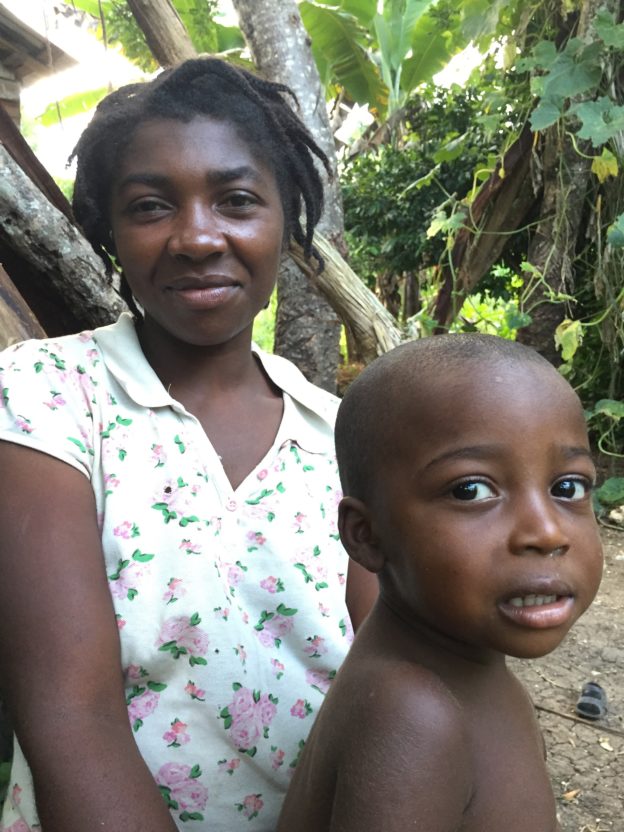It’s been four years since Orana graduated from the CLM program. She was part of a group of 350 women we worked with in Bay Tourib, an area of western Thomonde. She and her husband Sonn were able to transform their lives during the program’s 18 months and the couple of years that followed.
Previous to joining CLM, the family depended on what Sonn could earning working in the Dominican Republic. He would return to Bay Tourib whenever he had money he could bring with him. Orana would have to stretch out what he brought her to make it last. Now and again she would start a small commerce with some if the money, rather than just spending it on food, but frequent pregnancies got in the way. The couple had no livestock, and though they had access to land that belonged to Sonn’s family, they couldn’t afford to plant it. They frequently went hungry.
But the livestock Orana received as a CLM member encouraged Sonn to stick around. It gave him work to do. And the couple was able to use savings from their food stipend to begin investing in their fields. They took some of the proceeds from their harvest, and invested it in Orana’s small commerce. She sold plastic sandals at the local markets. Their lives took off.
There were bumps in the road. Sonn was the one who travelled to Port au Prince to buy Orana’s merchandise, and on one of his trips all their money was stolen. They had to start over again. But by the end of the program, Orana had a small but steady business. They couple had been able to buy a mule, so that she didn’t have to carry her merchandise to market on her head. More importantly, after she graduated they had been able to purchase the land they lived on and some additional farmland as well. They even started leasing additional plots to plant even more. Neither Orana nor Sonn was ever afraid of hard work, and they finally had resources to work with.
But the last two years have been hard. The couple feels as though they’ve taken a step backward. It started with Orana’s last pregnancy, her sixth. It was difficult. Though her boy was born healthy, she required expensive hospitalization in its last days, and the couple had to sell off her commerce to pay.
Then they suffered some poor harvests. Like most farmers in central Haiti, they would normally depend on millet, but the last two years’ millet crops were total losses. Some kind of parasitic invasion destroyed the millet in much of Haiti. Their pigeon peas were lost this year because of heavy rains that fell at the wrong time, and like most farmers who planted their beans late last winter, their current crop looks unpromising. “The folks who got their beans planted early are seeing a good harvest. But our land is hot. We have to wait longer. And it doesn’t look like we’ll get very much.”
Orana’s quick to point out that the kind of problems she and Sonn have now are nothing like the ones they used to have. She doesn’t have trouble keeping her children healthy and fed. “We have plantains and corn. We planted some malanga that should be ready in a few months, and we have pumpkins growing all around us.” They have another mule — they sold their first because it wasn’t strong enough — and they still keep goats. “I can pay for school for the kids, and as long as you have a few animals you must be doing ok.”
But Orana does have one problem, an unusual but a serious one. It concerns Daben, her fourth child. “He won’t go to school. And it’s not as if I couldn’t pay to send him. He doesn’t want to go.” Orana explains that Daben’s problem is teasing. He was born with both male and female sexual organs. I call him “he” because he identifies unambiguously as a male. The school is full of the kids he grew up around, and they torment him because he’s different. Orana isn’t sure what to do. “He’s a healthy boy. He’s never sick. There’s nothing wrong with him. But because of the way he is, he won’t go to school. And these days you’re not supposed to bring up your kids to be ignorant.” This last note has an especially strong ring to it coming from Orana because she never got to spend a day in school herself. “I think about it all the time. Even his younger brother’s in school.”
It’s gotten bad enough that Orana has thought about giving Daben up for adoption. “I wonder whether it would be different if he was living where no one knew him.” For now, she just wants medical advice to help her understand what options there might be.
